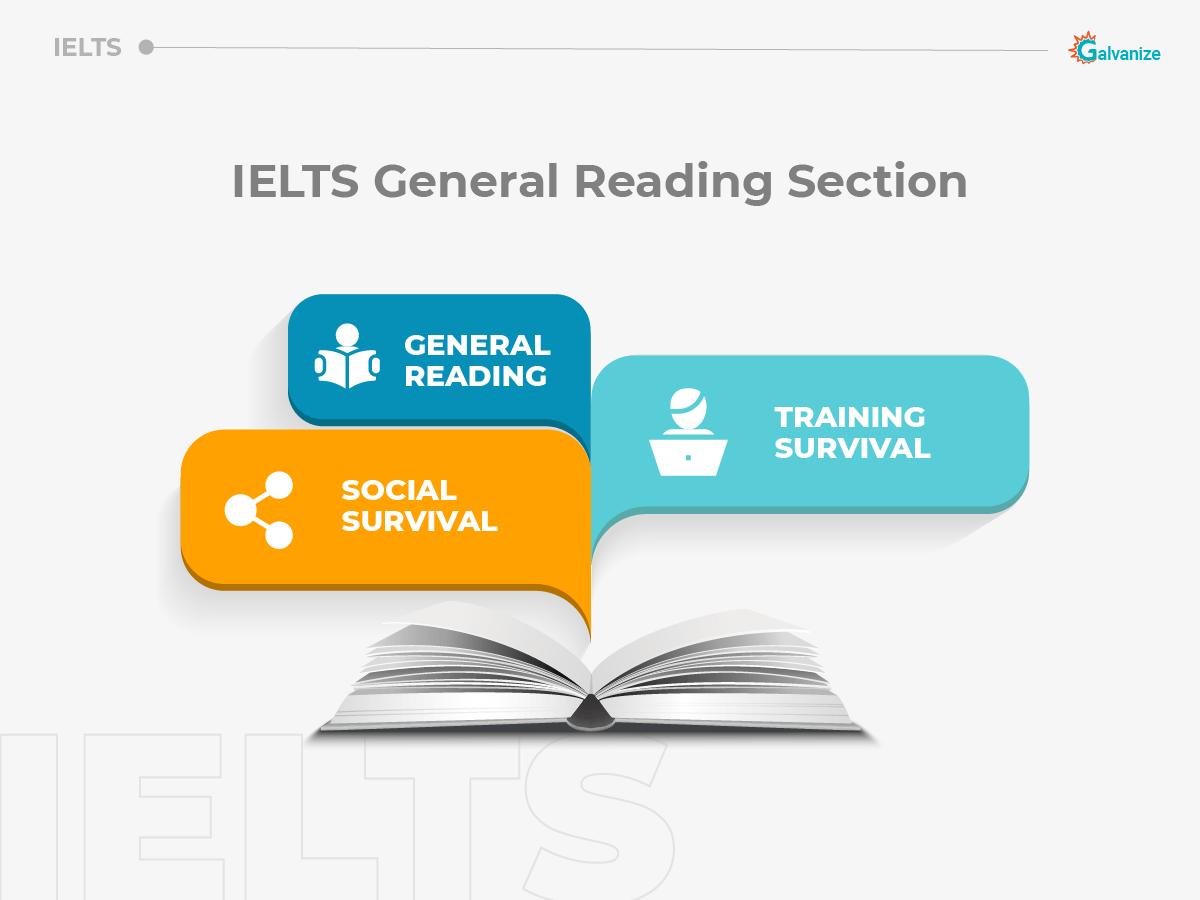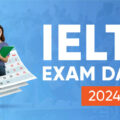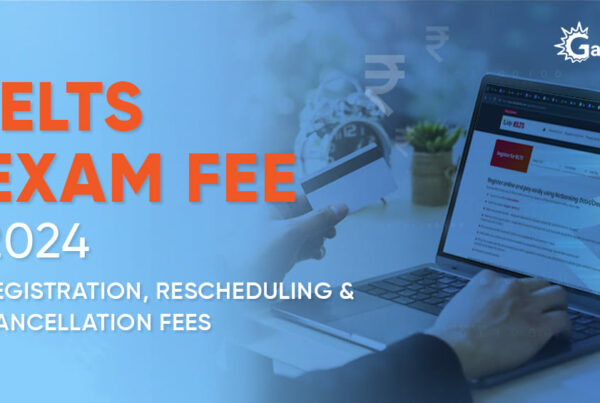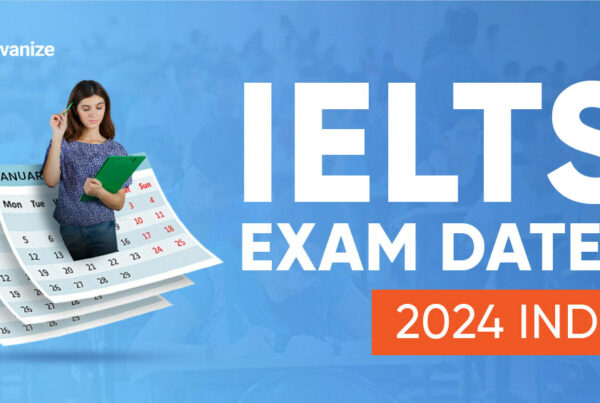
A Complete Guide To
IELTS Reading Tips
Chapter 1
IELTS Reading Overview
The International English Language Testing System or IELTS is primarily taken by anybody aiming to study, immigrate or work abroad in a predominantly English-speaking country. It is accepted by over 10,000 organizations in 100+ countries and the IELTS scores are valid for 2 years. For a detailed guide on the IELTS test patterns, registration, fees, and test dates, visit this excellent link. We definitely recommend you check it out before perusing the following sub-topics, in order to gain a holistic understanding of the test.
In this article, we will primarily be focusing on the Reading Section of the IELTS. It helps to gain an understanding of the bigger picture, that is IELTS’ Test Pattern or IELTS Overview, before diving into the Reading Section.
The IELTS Academic test duration is 2 hours and 45 minutes. This time is distributed amongst 4 sections of the test –
- Reading
This article focuses on this section. We will discuss the overview of this section in detail as we proceed. - Writing
The written word has been one of mankind’s significant achievements. Mastery of a language is incomplete without mastery over its script (if there is a script; there are many without written scripts as well!). - Listening
Listening is one of the most crucial parts of interpersonal communication. If you are to work or learn abroad, where the medium of instruction is in English, then you must learn to listen, analyze and understand. You should aim to do it in such a way that you are able to think in the English Language, the way you think in your mother tongue. - Speaking
Finally, we have the Speaking section. Speaking the language properly allows free-flowing conversation and communication. It is the last of the 4 fundamental skills that the IELTS tests.
By this point, I hope you have visited the aforementioned link which serves as a guide to the IELTS test. From now, we will be focusing mainly on the Reading Section. The Reading Sections of the Academic Test and the General Test are different in certain ways. We will be covering both now.
IELTS Reading Section Overview
The Reading Section of the IELTS is designed to test the various facets of reading skills, such as reading and understanding the main idea, summarization, recognition of the author’s opinions/argument, and being able to analyze the same. There will be a time limit of 60 minutes, with 40 questions in the Reading Section, regardless of whichever version of the IELTS you take.
IELTS Academic Test – Reading Section
The Academic Test is for aspirants looking to pursue their higher education at a University in an English-speaking country. It is tougher than the IELTS General, due to the fact that it tests the analytical, critical thinking, and reading skills of the candidate at a university level. This is to assess whether you will be able to keep up with the coursework and can communicate your ideas effectively.
There will be 3 long, detailed passages for reading, taken from various sources that range from academic texts and publications to newspapers and magazines. As mentioned earlier, these passages are at a university- level and require a higher order of thought compared to the General Test.
IELTS General Test – Reading Section
This version of the IELTS is intended for those looking to pursue their secondary education or gain work experience or participate in specialized training programs. It may also be a prerequisite for anyone looking to immigrate.
Unlike the Academic Test, the IELTS General Test does not test your higher-order thinking skills or critical reasoning at a university level. Instead, it seeks to assess your level of communication and basic comprehension, which serves the purpose of survival and communication in a new environment where the medium of communication is English.
Naturally, the kind of sources that are chosen for the passages and tasks within the General Test, is the sort that you can expect to come into contact with on a daily basis, such as – advertisements, company handbooks, newspapers, books, and magazines.
Here, there are 3 sections within the Reading Section.
Social Survival
You will be given 2 or more short but packed texts which contain a lot of information. These are texts that you will encounter on an everyday basis.
Training Survival :
You will be given 2 texts that contain information about a university or organization.
General Reading:
The last section involves 1 long text, which seeks to test basic reading comprehension.
That concludes the differences between the Reading Sections of the Academic Test and the General Test, broadly speaking.
Note: The following paragraphs are applicable to both versions of the IELTS.
There are 40 questions in the Reading Section, with an overall limit of 60 minutes for the entire section. What are the various question types that one can expect to encounter in the IELTS? Let us look at them.
IELTS Reading Section - Question Types
Multiple Choice Questions :
Obviously, this is a broader question type, where 1 MCQ may involve Sentence Completion and the best option to choose, while another involves Reading Comprehension and an answer to choose based on a given question. You will have to choose between multiple alternatives or options.
Identification of the author’s views/identification of the information within the passage
You will be asked whether a set of statements agree with the information within the passage or the views of the author. You will have to choose between true/false / not given or yes/no / not given. A key point to keep in mind is that whatever is given within the passage or by the author is what matters for the answers. Your own knowledge or opinions should not influence your answer.
Matching Information :
You will be required to locate specific details or information within the sections of the text. It may be an example that you have to locate, a summary, or even a definition.
Matching Headings :
Here, you will be required to recognize the main ideas or themes of the text/passage.
Matching features :
This type of question tests your ability to recognize opinions, theories, and the connections between the facts within the text.
Matching Sentences:
You will need to complete a sentence within a stipulated number of words. The words must come from the text.
Flow-chart Completion, Summaries, and Tables :
Once again, in these question types, you are tested on your ability to pay attention to the details provided and your ability to recognize the main ideas of the text.
Diagram-Label Completion :
There will be a description in the text. You will need to label the diagrams given.
Short Answer Questions :
There will be a given limit on the number of words that your answer may contain. The questions are related to the text given, and you will be required to answer them.
Now that we have an overview of the Reading Section, let us move on to the tips and tricks!
Chapter 2
IELTS Reading Tips and Tricks
Onto the core of our article – the IELTS tips and tricks that can make the difference between a band 6 and a band 8/9! Many of these have stood the test of time, and are imbibed with one common theme – logic. Some of these tips may seem obvious to you, while the rest can change the IELTS game for you. Having said that, go with what makes you comfortable. Even a non-native English Speaker can aim high and score well if they keep their wits about them.
IELTS Reading Tips and Tricks for Band 9
Read every day:
Firstly, you need to read. You need to read from myriad sources. Articles online, newspapers, novels, and journals are wonderful places to start. Try not to read consciously and just go with the flow of the text. Read curiously and read for fun. This will build your reading stamina, your vocabulary, and your reading speed. If there ever was a panacea to cracking the IELTS, it is this tip. READ. EVERY. DAY. It could be for half an hour or 45 minutes, but make sure you read.
Read the questions first:
This tip is a game-changer when it comes to the IELTS. You have 60 minutes to answer 40 questions linked to 3 texts. Time is of the essence, so you cannot read the text fully and take your own sweet time. Read the questions first. This will tell you what to look for when you get to the passage and help save precious time.
Reread the questions and understand them:
A small error in understanding what the question wants can pull you back a long way. Read the questions thoroughly and understand what it requires to find.
Scan, skim, and summarise:
This is a tip that will work wonders if you follow it up with Tip 1 (start reading today!). Skim the passage given to you and look for the main ideas, understand the layout of the text, highlight keywords and salient points, and try to make sense of what the passage is about. This is key when it comes to the Reading Section.
Key in the keywords in your head:
The IELTS involves a lot of information hunting. Questions will ask you to look for specific information and fill in/choose the right answers. While skimming, make sure you highlight keywords like dates, places, topics, numbers, etc. You will learn to recognize them with practice.
Familiarise yourself with various Question Types and practices:
The consensus among every dynamic IELTS community is that True/False/Not Given Question Types are the most difficult out there. While that may be true for them, what will prove to be your bane? Conversely, what type of questions will you excel at? You can only do so with practice tests. These will help you familiarise yourself with the IELTS Question Types (the list can be found above) and ensure that you have sufficient practice.
Vocabulary:
While using flashcards and memorizing a whole bunch of words may seem like the ideal way to build your vocabulary, reading from a variety of sources about various topics will prove to be the better technique out of the two. When you read articles and content from different genres, you are not only building your knowledge but also encountering new words as you progress. A sense of grammatical intuition will also develop. Read, learn the words you do not know, and keep reading. This will work far better than memorizing 7000 new words for the IELTS. Make sure you go back and learn the words you did not know in your practice tests as well. You can use this as a reference for learning any words you come across.
Distinguish the IELTS texts:
You will come across texts that can be divided into 2 broad categories –
- Descriptive – These texts are chronological in order and are usually full of facts and information about a particular topic. Example: History of the Silk Road.
- Discursive – These texts are centered around a theory or hypothesis based on the author’s research and evidence. It may also express certain opinions and put forth some arguments. Example: Does Meritocracy aid economic growth?
Answer all the questions even if you’re unsure of the answer:
The IELTS does not have any negative markings, so answer as many questions with as much accuracy as you can!
The Passage is sacrosanct:
Your own base of knowledge should not influence your answer choices. Read the question and try to understand what it wants. It is fixed on the author’s point of view or the contents of the passage. This will help enormously with question types such as True/False/Not Given.
Paraphrase:
The language in the question may not reflect the language in the text, so you must build your reading skills (you can only do this by reading every day) in such a way that you are able to paraphrase using synonyms and glean the meaning of the question.
Grammar is key:
Make sure that there aren’t any grammatical mistakes when you have to answer Short Answer Questions or any other Question Type that involves you writing/typing in the answer. Grammatical intuition, spelling, and sentence structure are all very important.
The above IELTS Reading Tips and IELTS Reading Strategies will definitely prove to be invaluable during the day of your test. The techniques above will certainly be useful. Having said that, work with what you are comfortable with. Make sure that you follow these basic IELTS Tips.
Chapter 3
IELTS Reading Time Management
Initially while practicing, you should take as much time as you want to understand the themes, hunt for information and learn all the words you come across. As you progress, you will need to focus on Time.
- Keep the above 8 tips in mind while managing time. Practice different question types, and learn to skim, scan and pick information. Read the questions properly.
- You have 40 questions to answer in 60 minutes, so you cannot spend more than 1 minute on every question.
- The rest (around 15 minutes) will be utilized for reading the texts.
- The last 5 minutes will be used for reviewing your answers.
- Do not waste time on a tough question. Get the easy ones out of the way and come back to the tough ones later. Remember, it is not you against that 1 question alone. There are 39 more waiting to be solved. Prioritise!
- Practice 20-minute, difficult texts. This will help train you beyond the IELTS level of difficulty, which will ensure that you ace the actual test.
Read every day, take IELTS practice tests, and stay calm. You got this!
Chapter 4
IELTS Reading Section FAQs
- Is Band 7 good?
- In order to score Band 7 in the Reading Section of the IELTS, one needs to get around 30 – 32 (Academic Test) and 34 – 35 (General Test) questions right out of a total of 40. It is a pretty good score. Band 7 and above are considered very good. Band 9 involves scoring 39 on all the questions right, so those standards are pretty high.
- How long should I spend on each text or passage?
- You should be looking to spend around 20 minutes for each passage. There are 3 passages in total and an overall sectional limit of 60 minutes. Spend your time wisely.
- Do all the answers come in order in the passage?
- No. Answers do not always come in order in the passage for all Question Types. Short Answer questions, Sentence Completion, and the True / False Question Types usually come in order, but be prepared for any contingency and do not assume answers come in order. Train yourself to hunt for information.
- What kind of passages appears in the Academic Test?
- Passages are usually taken from books, newspapers, academic texts and journals, and online publications. They are of the university level and usually contain complex words, illustrations, and charts. The non-verbal parts of the passage are also important and useful.
- Should I take the Academic Test or The General Test?
- We have covered this at the beginning of this article.
- Should I write the IELTS or TOEFL?
- The answer can be found in this link. Do go through it!












Thanks for the IELTS tips. Your Information is very important for IELTS Students.